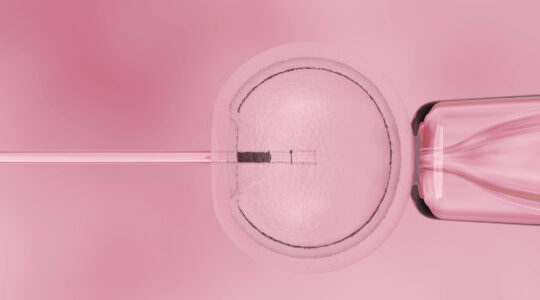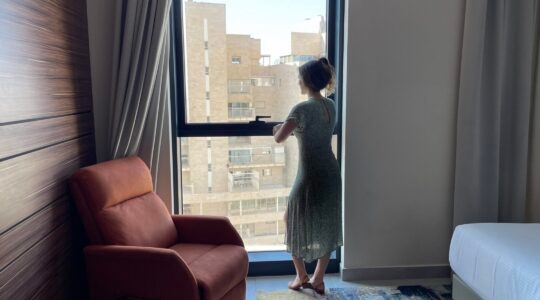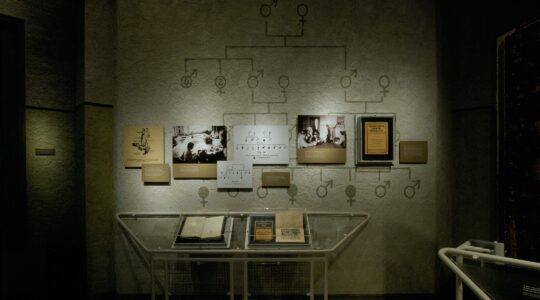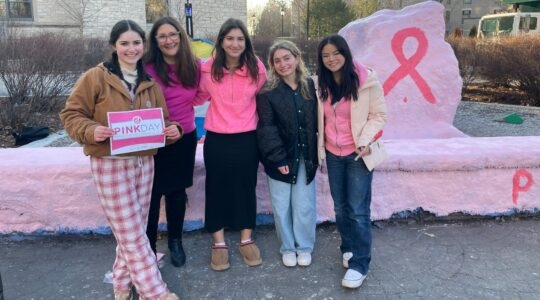After Shelby, a 30-year-old schoolteacher in New York, finished chemotherapy treatment last year for breast cancer, she hardly recognized herself in the mirror.
“I didn’t really have any hair and had very, very little eyebrows,” said Shelby, who asked that her last name be withheld for privacy. “My face was puffy from all the steroids.”
Bailey Kramer, 30, a medical assistant in North Branch, Michigan, who went through chemo two years ago, feared that losing her hair would prompt unwanted questions from her 3-year-old.
“I didn’t want him to know that anything was going on,” recalled Kramer. “I wanted his life to be as absolutely as normal as possible.”
Fortunately, Kramer and Shelby both were able to receive cosmetic aid thanks to a project called Best Face Forward 2.0 run by Sharsheret, the Jewish breast cancer and ovarian cancer organization. The program offers qualifying women funding for certain non-medical services considered critical to the healing process but not usually fully covered by health insurance.
The services, meant to help with mental health and negative body image and self-image, include such things as nutrition assistance, hair preservation therapies, human-hair wigs, tattooing for nipples and eyebrows, and integrative holistic and yoga therapies. These services can cost thousands of dollars without Sharsheret’s financial assistance program.
“Cancer is expensive,” said Sharsheret CEO Elana Silber. “By providing financial assistance for non-medical services, we are able to address the growing problem of financial toxicity associated with cancer treatment and improve quality of life for hundreds of women and their families.”
Since the program started in August 2019 thanks to seed funding from a private Jewish foundation, Best Face Forward 2.0 has helped nearly 2,000 women and distributed nearly $2 million, with an average of $2,500 in payments per patient or subsidies for cosmetic and other services during and after cancer treatment.
Through the program, Shelby was fitted with a human-hair wig that looks just like her long blond locks, tattooing called microblading to replace her eyebrows, and three-dimensional tattooing (micropigmentation of the nipple and areola) for her nipples.
Kramer was able to keep most of her hair using a method called cold-capping or scalp-cooling in which a specially fitted cap freezes the hair follicles as the patient receives chemo, preserving the strands.
In order to qualify for Sharsheret’s program, patients either must have or be at high risk for a diagnosis of breast cancer or ovarian cancer due to a genetic mutation such as the BRCA gene and need to qualify on a strict financial eligibility basis.
“Women of all ages come from all over the country and their family status runs the gamut,” said Stephanie Siegel, the social worker who administers the program. “I’ve spoken to women from all 50 states — even Alaska and Hawaii.”
The program also has helped connect these women to other free services Sharsheret offers, including genetic and mental health counseling, peer support, patient support, financial wellness checks, and quality-of-life kits such as mastectomy products or “busy boxes” for keeping kids occupied while their mothers undergo treatment.
Through Best Face Forward 2.0, Sharsheret directs patients to tattoo artists and cold-cap providers it has vetted, recommending only those who are expert at the procedures. Sharsheret works with a veteran Brooklyn wigmaker who sends hair wigs all over the country. Patients say the aid has been critical in helping them feel like women again after treatment side effects that can feel like trauma upon trauma.

Through the program Best Face Forward 2.0, Megan, a cancer patient in the Dallas area, was able to get a wig and microblading for her eyebrows. (Courtesy)
“The wig maker makes wigs for Orthodox women, along with women who have lost their hair due to medical conditions such as cancer or alopecia,” Siegel said. “The wigs are high end and beautiful. It is nice that no matter where the woman lives she is getting a customized wig from her by providing measurements and picking the color and texture, all from the comfort of their own homes. Sharsheret reimburses for styling when the women receive their wigs.”
She added, “The program has been very successful both in expanding the use of Sharsheret’s services and network and attracting financial support. Very often donors are interested in funding things that are really tangible, like financial assistance for low-income cancer patients.”
Megan, 40, the sole breadwinner for a family of four in the Dallas-Fort Worth area, was working for a pharmaceutical-distribution company when chemotherapy took her hair last year after her diagnosis in October 2022. She felt overwhelmed managing her treatment and trying to maintain a semblance of normal life.
“When you’re diagnosed with cancer and you’re trying to work and manage your family and take care of kids, cancer is like a second career,” said Megan, who asked that her last name be withheld for privacy. “I had video conferences with customers and I just didn’t want to have to answer a whole lot of questions about, like, why are you bald? Why are you wearing a turban? I just wanted people to focus on my career.”
Through Best Face Forward 2.0, Megan got a wig, microblading for her eyebrows and nipple tattoos.
“Losing your hair, your eyebrows, your eyelashes, all the feeling in your chest — you just don’t feel like your body is your own anymore,” Megan said. “Just putting on a wig to feel more like yourself again — it’s huge. Having my eyebrows tattooed and my nipples tattooed was a huge help — as was not having to worry about how I was going to pay for it all. Because it’s really expensive!”
Kramer said she appreciated not only the material assistance she received from Sharsheret, but the personal attention she received from the Sharsheret social worker who handled her case.
“I had 16 rounds of chemo, so she checked in on me constantly,” Kramer recalled. “It wasn’t like I got this subsidy and then she disappeared. It’s like a constant relationship. I can’t tell you how much that means.”
Sharsheret has expanded its Best Face Forward 2.0 program from quality-of-life services to emergency relief funds that can be allocated for such needs as rent money or car repairs necessary to get to and from treatments. Sharsheret finds patients through Facebook groups, word of mouth, and referrals from other organizations.
“Sharsheret’s financial assistance is not merely patching a need, but saving us cancer survivors from another kind of illness: the anxiety of a financial hardship,” said a caller who received one month’s rent from the Sharsheret emergency relief grant.
“After being sick and missing even more work, I didn’t have to stress and worry about how I was going to get the rent payment,” another grantee said. “Instead I was able to focus on getting better.”
In the past year, Sharsheret doubled the amount of money distributed in response to the significant increase in numbers of women reaching out.
To access Sharsheret’s support care and learn more about the financial assistance program, you may contact the organization using this form or call 866 474-2774.
This article was sponsored by and produced in partnership with Sharsheret, the national Jewish breast cancer and ovarian cancer organization. This article was produced by JTA’s native content team.
More from Sharsheret





